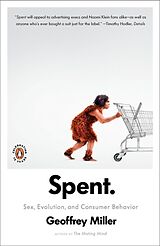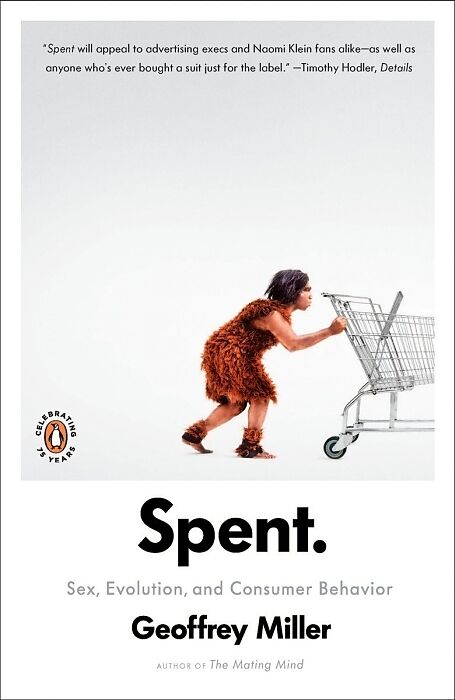Spent
Einband:
Kartonierter Einband
EAN:
9780143117230
Untertitel:
Sex, Evolution, and Consumer Behavior
Autor:
Geoffrey Miller
Herausgeber:
Penguin Publishing Group
Anzahl Seiten:
386
Erscheinungsdatum:
25.05.2010
ISBN:
978-0-14-311723-0
Informationen zum Autor Geoffrey Miller is an evolutionary psychologist and author of The Mating Mind . He was educated at Columbia and Stanford and is associate professor of psychology at the University of New Mexico. He lives in Albuquerque, New Mexico, with his wife, daughter and many products. Klappentext A leading evolutionary psychologist probes the unconscious instincts behind American consumer culture Illuminating the hidden reasons for why we buy what we do, Spent applies evolutionary psychology to the sensual wonderland of marketing and perceived status that is American consumer culture. Geoffrey Miller starts with the theory that we purchase things to advertise ourselves to others, and then examines other factors that dictate what we spend money on. With humor and insight, Miller analyzes an array of product choices and deciphers what our decisions say about ourselves, giving us access to a new way of understanding-and improving-our behaviors to become happier consumers.1 Darwin Goes to the Mall Consumerist capitalism: it is what it is, and we shouldn't pretendotherwise. But what is it, really? Consumerism is hard to describe when it'sthe ocean and we're the plankton. Faced with the unfathomable, we could start by asking some freshquestions. Here's one: Why would the world's most intelligent primatebuy a Hummer H1 Alpha sport- utility vehicle for $139,771? It is not apractical mode of transport. It seats only four, needs fifty- one feet inwhich to turn around, burns a gallon of gas every ten miles, dawdlesfrom 0 to 60 mph in 13.5 seconds, and has poor reliability, accordingto Consumer Reports . Yet, some people have felt the need to buy it asthe Hummer ads say, Need is a very subjective word. Although common sense says we buy things because we think we'llenjoy owning and using them, research shows that the pleasures ofacquisition are usually short- lived at best. So why do we keep ourselveson the consumerist treadmill working, buying, aspiring?Biology offers an answer. Humans evolved in small social groupsin which image and status were all- important, not only for survival,but for attracting mates, impressing friends, and rearing children.Today we ornament ourselves with goods and services more to makean impression on other people's minds than to enjoy owning a chunkof mattera fact that renders materialism a profoundly misleadingterm for much of consumption. Many products are signals first andmaterial objects second. Our vast social- primate brains evolved to pursueone central social goal: to look good in the eyes of others. Buyingimpressive products in a money- based economy is just the most recentway to fulfill that goal. Many bright thinkers have tried to understand modern consumerismby framing it in a historical context, asking, for example: Howdid we go from showing off our status with purple- bordered togas inancient Rome to showing it off with Franck Muller watches in modernManhattan? How did we go from the 1908 black Model- T Fordto the 2006 Flame Red Pearl Hummer? How did we go from eatingcanned tuna (about $4 per pound) to eating magical plankton(marine phytoplankton, the ultimate nutrogenomic, superchargedwith high- vibration crystal scalar energy healing frequencies $168for fifty grams, or $1,525 per pound, from Ascendedhealth.com) as aluxury food? This book takes a different approach from that of historical analysis.It frames consumerism in an evolutionary context, and thusaddresses changes across much longer spans of time. How did we gofrom being small- brained semisocial primates 4 million years ago tobeing the big- brained hypersocial humans we are today? At the sametime it addresses differences across species. Why do we pay so muchfor plankton, the most common form of biomass on the planet? Bluewhales eat four tons of it per day, which would cost $12.2 million perday (plus shipping) from Ascended...
Autorentext
Geoffrey Miller is an evolutionary psychologist and author of The Mating Mind. He was educated at Columbia and Stanford and is associate professor of psychology at the University of New Mexico. He lives in Albuquerque, New Mexico, with his wife, daughter and many products.
Klappentext
A leading evolutionary psychologist probes the unconscious instincts behind American consumer culture
Illuminating the hidden reasons for why we buy what we do, Spent applies evolutionary psychology to the sensual wonderland of marketing and perceived status that is American consumer culture. Geoffrey Miller starts with the theory that we purchase things to advertise ourselves to others, and then examines other factors that dictate what we spend money on. With humor and insight, Miller analyzes an array of product choices and deciphers what our decisions say about ourselves, giving us access to a new way of understanding-and improving-our behaviors to become happier consumers.
Leseprobe
1
Darwin Goes to the MallConsumerist capitalism: it is what it is, and we shouldn’t pretendotherwise.But what is it, really? Consumerism is hard to describe when it’sthe ocean and we’re the plankton.Faced with the unfathomable, we could start by asking some freshquestions. Here’s one: Why would the world’s most intelligent primatebuy a Hummer H1 Alpha sport- utility vehicle for $139,771? It is not apractical mode of transport. It seats only four, needs fifty- one feet inwhich to turn around, burns a gallon of gas every ten miles, dawdlesfrom 0 to 60 mph in 13.5 seconds, and has poor reliability, accordingto Consumer Reports. Yet, some people have felt the need to buy it— asthe Hummer ads say, “Need is a very subjective word.”Although common sense says we buy things because we think we’llenjoy owning and using them, research shows that the pleasures ofacquisition are usually short- lived at best. So why do we keep ourselveson the consumerist treadmill— working, buying, aspiring?Biology offers an answer. Humans evolved in small social groupsin which image and status were all- important, not only for survival,but for attracting mates, impressing friends, and rearing children.Today we ornament ourselves with goods and services more to makean impression on other people’s minds than to enjoy owning a chunkof matter—a fact that renders “materialism” a profoundly misleadingterm for much of consumption. Many products are signals first andmaterial objects second. Our vast social- primate brains evolved to pursueone central social goal: to look good in the eyes of others. Buyingimpressive products in a money- based economy is just the most recentway to fulfill that goal.Many bright thinkers have tried to understand modern consumerismby framing it in a historical context, asking, for example: Howdid we go from showing off our status with purple- bordered togas inancient Rome to showing it off with Franck Muller watches in modernManhattan? How did we go from the 1908 black Model- T Fordto the 2006 “Flame Red Pearl” Hummer? How did we go from eatingcanned tuna (about $4 per pound) to eating magical plankton(“marine phytoplankton, the ultimate nutrogenomic, superchargedwith high- vibration crystal scalar energy healing frequencies”— $168for fifty grams, or $1,525 per pound, from Ascendedhealth.com) as aluxury food?This book takes a different approach from that of historical analysis.It frames consumerism in an evolutionary context, and thusaddresses changes across much longer spans of time. How did we gofrom being small- brained semisocial primates 4 million years ago tobeing the big- brained hypersocial humans we are today? At the sametime it addresses differences across species. Why do we pay so muchfor plankton, the most common form of biomass on the planet? Bluewhales eat four tons of it per day, w…

Leider konnten wir für diesen Artikel keine Preise ermitteln ...
billigbuch.ch sucht jetzt für Sie die besten Angebote ...
Die aktuellen Verkaufspreise von 6 Onlineshops werden in Realtime abgefragt.
Sie können das gewünschte Produkt anschliessend direkt beim Anbieter Ihrer Wahl bestellen.
Loading...
Die aktuellen Verkaufspreise von 6 Onlineshops werden in Realtime abgefragt.
Sie können das gewünschte Produkt anschliessend direkt beim Anbieter Ihrer Wahl bestellen.
| # | Onlineshop | Preis CHF | Versand CHF | Total CHF | ||
|---|---|---|---|---|---|---|
| 1 | Seller | 0.00 | 0.00 | 0.00 |
